What is Dyspareunia and How Can It Be Treated?
Intimacy should be pleasurable, but not painful. Unfortunately, there are a number of factors that can contribute to discomfort or pain during intercourse, a condition known as dyspareunia. Visit The OB-GYN and Incontinence Center and meet Dr. Prema Kothandaraman if you are experiencing any issues. For more information, contact us today or book an appointment online. We have convenient locations to serve you in Arcadia, and Glendale, CA.




Table of Contents:
What is dyspareunia?
What causes dyspareunia?
At what age can dyspareunia start for women?
Are there different types of dyspareunia?
Some people with the condition may not realize they have dyspareunia, but may instead think that some discomfort is normal during sexual intercourse. However, any pain during intercourse should not be ignored and, if occurring more than once, should receive professional medical attention as soon as possible.
Dyspareunia is a condition characterized by pain, either in the genital area or within the pelvis, during intercourse. The pain can be sharp or intense and can occur before, during, or after intercourse. Considered a type of sexual dysfunction, dyspareunia is much more common in women than it is in men. Treatment for dyspareunia typically involves identifying the underlying causes of pain, then developing a treatment plan that effectively addresses the root cause and sufficiently alleviates the symptoms.
Several conditions can cause dyspareunia. For some women, it is a sign of a physical problem; for others, it may be the result of emotional factors. Common physical causes of dyspareunia include:
• vaginal dryness, such as from:
• menopause
• childbirth
• breastfeeding
• medications
• too little arousal before intercourse
• skin disorders that cause ulcers, itching, burning
• infections, including yeast or urinary tract infections
• trauma from childbirth, an accident, or surgery
• vulvodynia (pain in the vulva area)
• vaginitis, or inflammation of the vagina
• vaginismus (spontaneous tightening of vaginal wall muscles)
• endometriosis
• cystitis
• pelvic inflammatory disease (PID)
• uterine fibroids
• irritable bowel syndrome (IBS)
• radiation and chemotherapy
Certain factors are also associated with dyspareunia, including those that reduce sexual desire or affect a person’s ability to become aroused, such as:
• stress, which can result in tightened pelvic floor muscles
• fear, guilt, or shame related to sex
• self-image or body issues
• medications such as birth control pills
• relationship problems
• conditions such as arthritis and diabetes
• history of sexual abuse or rape
Dyspareunia, which is more common in women than it is in men, can start at any age. It affects ten to twenty percent of people in the United States at some point in their lives, making it a very prevalent condition. Certain factors that can lead to dyspareunia are more common with age, such as menopause or childbirth; therefore, dyspareunia is more common with age.
Dyspareunia is a general term for discomfort or pain during sexual intercourse; it can be categorized into several different types based on the location of the pain. These include:
• Intraorbital or Superficial Dyspareunia — Known as entry pain, this pain is felt at the entrance to the vagina during initial penetration. Some factors associated with entry pain include infection, injury, or lack of lubrication.
• Collision Dyspareunia — Deep pain, which typically affects the cervix or lower abdomen, occurs in deep penetration and can feel worse in certain sexual positions. A medical condition or prior surgery usually causes sexual pain that occurs deeper, and can be difficult to treat.
Pain during intercourse can also be described as primary, secondary, complete or situational:
• Primary pain is pain that has been present since becoming sexually active
• Secondary pain develops after experiencing pain-free sex
• Complete pain means that pain occurs every time sexual intercourse
• Situational pain is when the pain only happens at certain times
The professionals at The OB-Gyn and Incontinence Center can help you figure out what is causing you discomfort during sex. Call us today to book an appointment with our painful intercourse treatment specialist. We look forward to serving you! For more information, call us today or book an appointment online. We have convenient locations to serve you. We serve patients from Arcadia CA, Glendale CA, Monrovia CA, Pasadena CA, Los Angeles CA, Burbank CA and surrounding areas.


Additional Services You May Need
▸ Urogynecology
▸ Minimally Invasive Gynecology
▸ Monalisa & Medical Aesthetics
▸ Bioidentical Hormone Replacement Therapy
▸ Urinary Incontinence
▸ Pelvic Organ Prolapse
▸ Painful Bladder
▸ Urinary Tract Infection
▸ Genitourinary Syndrome of Menopause
▸ Female Sexual Dysfunction
▸ Urinary Retention
▸ Vaginal Laxity & Prolapse
▸ Postpartum Pelvic Floor Problems
▸ PCOD
▸ Bladder Prolapse Repair
▸ Urgent PC
▸ Fibroids
▸ Excessive Bleeding
▸ Pelvic Pain
▸ Birth Control & IUD
▸ Vaginal & Pelvic Infection
▸ Monalisa Touch
▸ STD
▸ TempsureVitalia
▸ Biote Pellet Therapy
▸ Topical BHRT
▸ Flexsure
▸ Rectal Prolapse Repair
▸ Tempsure ENVI
▸ Minimally Invasive Pelvic Surgery for Incontinence



